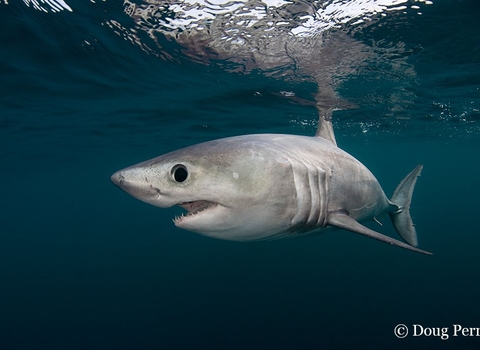
Porbeagle © Doug Perrine
Porbeagle shark
Scientific name
Lamna nasusWhen to see
June to OctoberSpecies information
Statistics
Length: Up to 365cmWeight: Up to 230kg
Average Lifespan: Can live for over 50 years
Habitats
About
This large shark is usually found in deeper water, where it hunts a variety of smaller fish including mackerel, whiting and herring, as well as octopus, squid and cuttlefish.They are strong swimmers and tagging studies have shown that they can travel huge distances. One porbeagle shark tagged in Irish waters was later found as far away as Newfoundland in Canada!
Porbeagle sharks are endothermic, which means they can maintain a higher body temperature and keep themselves warmer than the surrounding water. This is a big advantage for them as it allows them to live and hunt in colder seas than many other sharks.
How to identify
The porbeagle shark is a brilliant ‘mackerel’ blue with a white belly and characteristic white mark at the rear base of the dorsal fin. It is a robust but streamlined shark with a pointed snout and large black eyes without protective lids.Distribution
Found around all UK coasts, as well as in temperate waters world-wide (excluding the North Pacific).In our area
The Porbeagle shark inhabits the deep waters off the north side of Rathlin Island and around Malin Head, and can also be found around many of the WWII wrecks off Culdaff. Porbeagle are found on all coasts around Ireland but are most common north of Lough Swilly in Donegal and also coasts of Galway, Clare and Cork. Because of their preference for deep water, you have to be very lucky to see one of them! Especially because they are categorised as Critically Endangered in our waters by the IUCN Red List. They are on the NI Priority Species list, therefore we hope to provide evidence through the Sea Deep project to ensure spatial protections for them.
Did you know?
The porbeagle shark is often mistaken for the great white shark, leading to claims of great white sharks in UK waters. However, the great white has never been recorded in UK seas. Porbeagle sharks are half the size of a great white shark.The Porbeagle shark inhabits the deep waters off the north side of Rathlin Island and around Malin Head, and can also be found around many of the WWII wrecks off Culdaff. Porbeagle are found on all coasts around Ireland but are most common north of Lough Swilly in Donegal and also coasts of Galway, Clare and Cork. Because of their preference for deep water, you have to be very lucky to see one of them! Especially because they are categorised as Critically Endangered in our waters by the IUCN Red List. They are on the NI Priority Species list, therefore we hope to provide evidence through the Sea Deep project to ensure spatial protections for them.
